Attacking fears that truth might be “dead,” a thought proposed by the April 3 Time mag, the Arthur W. Page Society this week reaffirmed its commitment to truth and facts and said journalists and PR people must work closely together.
 |
“Our profession is intertwined with journalism,” said a statement from the 35-member board headed by David Samson, general manager of PA, Chevron.
The statement was read to 330 members at the spring seminar of the group at the Conrad New York Hotel.
Said the statement: "The Arthur W. Page Society is rooted in the Page Principles, the first of which is 'Tell the truth.' As communicators, our duty is to deal honestly in facts, even when they are inconvenient. Truth is not dead, as some may fear. It remains, as ever, the foundation of credibility and the lifeblood of trust. On behalf of the members of the Page Society, we reaffirm our deep commitment to ensuring truth in the practice of public communication."
|
|
|
photos: Eliot Mizrachi |
|
|
|
|
|
|
|
|
|
|
|
|
"Corporations, governments, non-governmental organizations and media don't get everything right. But all of us must share a commitment to the facts and the pursuit of the truth. Distorting information, withholding the truth or promulgating falsehoods violates the public's trust and denies its rightful opportunity to be engaged and informed. This is precisely why democratic societies require a free and fair press. In this respect, our profession is intertwined with journalism."
"The Page Society declares its support for journalists and public relations professionals who fearlessly fight for the truth, bring facts to light and hold government, business and other institutions accountable."
Roger Bolton, Page president, made a live presentation on the issue yesterday morning on the subject. He then had a live a webcast conversation with Gary Sheffer, former VP-communications and PA of General Electric, explaining why Page decided to take a public stance on its commitment to truth on behalf of the membership.
Activism Challenges Companies
Theme of the conference is “The Changing Face of Activism: Reaching Common Ground in a Polarized World.”
Andy Polansky, CEO of Weber Shandwick and chair of the conference, said members must think differently about the stakeholder environment and their ability as communicators to engage effectively.
Nik Gowing and Chris Langdon, co-authors of Thinking the Unthinkable, said leaders must have a keen sense for anticipating the future and both the ability and courage to take action to head off threats.
The real challenge, they said, is actually "thinking the unpalatable" and coming to terms with things humans might deny rather than confront.
"There's permafreeze myopia," said Gowing, arguing that willful blindness and groupthink are often systematic in that the "mavericks" who think way outside the box are often shuffled to the side. "It's not about rewriting the systems in companies," he added, "but reconfiguring the human software."
Lyon Focuses on Employee Activism
Dawn Lyon, VP of corporate affairs, Glassdoor, told a panel on employee activism that "if employees feel that they're not heard, that can have downstream implications for customers and other stakeholders, and ultimately diminish the value that you deliver."
Two in three employees expect their companies to take a stand on social issues, she said. “When it comes to issues like diversity and inclusion, the most effective way to engage employees is to be authentic – be honest about the reality, be clear about what actions are being taken, and keep stakeholders informed on the progress that's being made.”
David Benoit, activism reporter at the Wall Street Journal, said WSJ has a policy of “no surprises,” meaning it shares stories with subjects before they hit print.
Barrett Golden of Joel Frank said that “ninety percent of the work that we do with press is on background, helping educate them in advance about the issues and the company so they're more apt to reflect the company's position fairly and accurately.”
Mike Miller, former General Counsel of Monster.com, said he viewed his job as helping the CCO communicate to the C-Suite and the board to ensure the company was mindful not only of its financial risks but also of the communication that must take place between company and activist investors.
Board, Employees Must Get Same Message
Bill Wohl of Commvault, who moderated, said communicators must "conduct PR as if the whole company depends on it," since it sometimes does when it comes to dealing with activist investors.
Farooq Kathwari, CEO of Ethan Allen, who has a reputation as an “activist CEO,” said companies of all types remain must true to their culture and values. "You need to be willing to lose for a principle," he said. The actions that the company takes – and the behavior that its leadership exhibits – manifests itself throughout the company, he said.
He advised leaders to communicate a single message to all audiences. "Our messages to employees and to board members has to be the same, they have to believe in who we are. If you don’t convince your people, nothing much happens.”
Samson, summarized Day One of the conference by saying it was about company values, and how they relate to the actual value that a company creates in the world – for employees, for customers, for shareholders, and for society at large. He said that in this "era of big activism" PR people have an opportunity to lead not only on what the company says, but what it stands for and believes in.”
Page Covers WSJ's Baker, Other Speakers
Eliot Mizrachi, VP-communications of Page, posted coverage of today’s panels. Some coverage is not by Mizrachi.
Wall Street Journal editor-in-chief Gerry Baker said media can fail to realize their natural tendency to focus on issues that aren't at the fore between the coasts. Bringing light to immigration, transgender rights and gay marriage are certainly important social issues, but in Baker's view, the press – and at the same time, the political establishment – has failed to fully appreciate how disaffected and marginalized at least half of the U.S. is in the current economic environment.
He said the Presidential campaign, as reported by other attendees at the event, showed "the massive gulf between the mainstream media and so many American voters. There was this arrogant, disdainful, condescending view that anyone for Trump was bad or stupid. It was a terrible indictment of the media and of how the media has become so detached from people."
Baker, according to a story by Sydney Ember in the Feb. 13, 2017 New York Times, "vigorously defended his newspaper’s coverage of President Trump, rejecting suggestions that The Journal had not been aggressive enough."
The story said: "Facing tough questioning at a town-hall-style meeting with the staff, Mr. Baker denied that The Journal had been too soft in its coverage, according to several people who participated in the meeting. He suggested that other papers had discarded objectivity, and that anyone who wanted to work at an organization with a more oppositional stance toward the administration could find a job elsewhere, these people said."
“We can’t allow ourselves to be dragged into the political process, to be a protagonist in the political fight,” Ember quoted him as saying according to one of the people. The story further said, "He said that Americans already distrusted the news media, and that if The Journal covered Mr. Trump in an overly confrontational way, that distrust might increase."
Echoing that point was CNN commentator Sally Kohn, who previously appeared on Fox News debating conservative pundits. She expressed her fear that we lack civility in our discourse, and are too predisposed to demonize and hate the so-called "other side." "You can't argue with feelings," she said, "but when feelings are damaged, it's more difficult for persuasion to happen.
So it's important to affirm peoples' feelings even if you don't validate their point of view." At the same time, she points out that the rate at which people defriend people on social media due to their opposing political views is on the rise – a troubling reinforcement of the media echo chambers that we can now choose to live in. Read more.
GE's Welch Saw Need for Trust
Baker’s comments were similar to those of former GE chief executive Jack Welch, who was on the same stage two years before. Welch noted then that the relationship between CEO and CCO is based on "truth and trust." So, too, is the relationship between CCO and media, said Baker.
While it has been forever the case that spokespersons, political leaders and others have been "economical with the truth," there is concern that the boundaries have shifted closer to outright lies – and that reporting misinformation as a lie, which insinuates actual intent to deceive, is a complicated issue for journalists. But take heart, he says – the story of those student journalists in Kansas who exposed the false credentials of their new principal, ultimately leading to her ouster, bodes well for the survival of the foundational essence of journalism – to seek truth and bring it to light.
That's all well and good, but it's no secret that for every honest reporter running down a story, there is a propaganda machine churning out blatantly false news stories dressed up as real news. "There are best practices for fake news," said Adam Singolda, CEO of Taboola. It's gotten very adept at looking like the real thing. But the true challenge, especially for media platforms – news, search and social alike – is to separate the real from the fake. As individuals, we have to make smart choices. "Nobody eats sushi on a plane," Singolda added. And nobody would feel bad if you got sick doing so. But on the distribution side, that's something that no algorithm can do reliably – at least not yet.
Nevertheless, the real heroes in media, according to Singolda, are the ones who resist the temptation to pay attention to fake news "clickbait," rejecting the business value of those eyeballs in favor of the real value of maintaining trust.
PR Execs Should be Activists--Mallory
Tamika Mallory, one of the organizers of the Women's March that followed the presidential inauguration, implored the audience to think about themselves as activists, because in some form or another, we all are. As communicators, we bear the responsibility to ensure that brands are true to their values while being sensitive to cultural and social issues.
It can be easy for those at the top of an organization to think they know it all, she said, but it's impossible to know what you don't know about the experience, feelings and perspectives of other people. "In your companies, there's someone working in the kitchen that you can run stuff by. Do it. They'll be happy to tell you." Companies can only benefit from welcoming and considering diverse perspectives rather than succumbing to arrogant groupthink.
"Activists are passionate people who are fed up," she added. But that passion must be directed at revealing the truth rather than stifling it. The media decides which parts of the issues to show us, but anyone on social media – journalists, bloggers and others – are bringing these realities to light. "Telling those stories truthfully is activism."

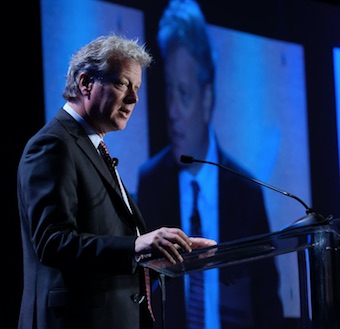 Andy Polansky, Weber Shandwick
Andy Polansky, Weber Shandwick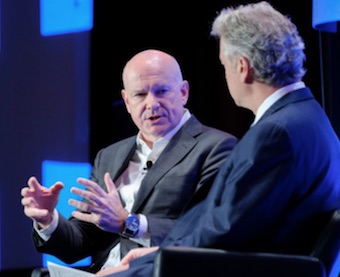 Gerard Baker (L), WSJ editor-in-chief, with Andy Polansky
Gerard Baker (L), WSJ editor-in-chief, with Andy Polansky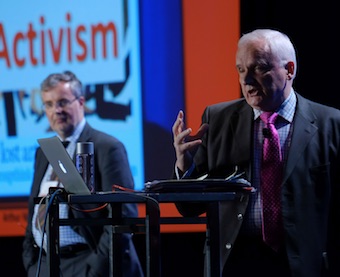 Chris Langdon (L) & Nik Gowing, co-authors, Thinking the Unthinkable
Chris Langdon (L) & Nik Gowing, co-authors, Thinking the Unthinkable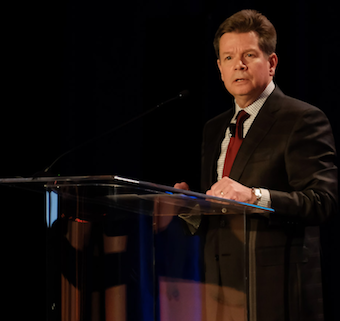 Dave Samson, Chevron
Dave Samson, Chevron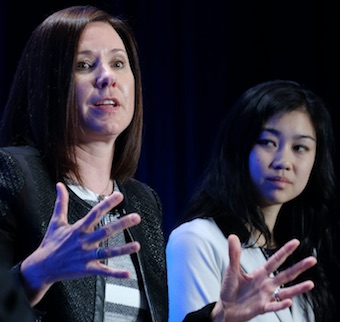 Dawn Lyon (L), Glassdoor; Tracy Chou, Project Include
Dawn Lyon (L), Glassdoor; Tracy Chou, Project Include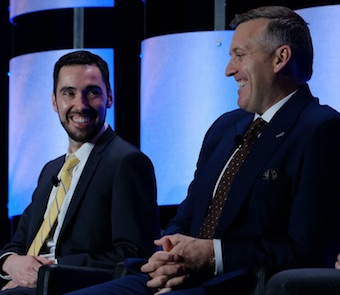 David Benoit (L), WSJ; Mike Miller, Monster.com (formerly)
David Benoit (L), WSJ; Mike Miller, Monster.com (formerly)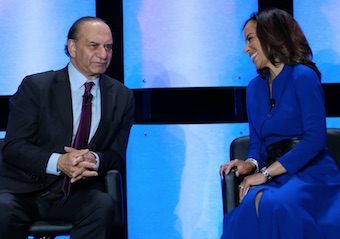 M. Farooq Kathwari (L), Ethan Allen; Stacy Sharpe, Allstate
M. Farooq Kathwari (L), Ethan Allen; Stacy Sharpe, Allstate
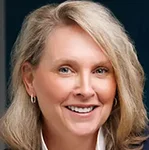 Maggie Moran, who is well-connected in New Jersey and New York Democratic politics, has established Moxie Strategies in Asbury Park, NJ.
Maggie Moran, who is well-connected in New Jersey and New York Democratic politics, has established Moxie Strategies in Asbury Park, NJ.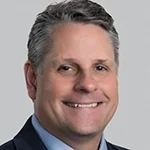 Husch Blackwell Strategies has added FleishmanHillard alum Michael Slatin as a principal in its public affairs group.
Husch Blackwell Strategies has added FleishmanHillard alum Michael Slatin as a principal in its public affairs group.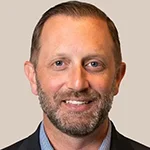 Rory Cooper, a veteran Republican operative and policy specialist, has joined Teneo’s Washington office as senior managing director in its strategy & communications practice.
Rory Cooper, a veteran Republican operative and policy specialist, has joined Teneo’s Washington office as senior managing director in its strategy & communications practice.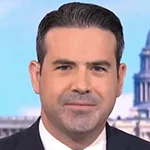 Brian Fallon, who served as national press secretary for Hillary Clinton’s 2016 presidential run, is signing on next month as Vice President’s Kamala Harris’ campaign communications director.
Brian Fallon, who served as national press secretary for Hillary Clinton’s 2016 presidential run, is signing on next month as Vice President’s Kamala Harris’ campaign communications director. TikTok is nothing more than a Chinese propaganda tool that poses “a grave threat to America’s national security and, in particular, impressionable children and young adults,” say two Congressmen who want the platform registered as a foreign agent.
TikTok is nothing more than a Chinese propaganda tool that poses “a grave threat to America’s national security and, in particular, impressionable children and young adults,” say two Congressmen who want the platform registered as a foreign agent.


 Have a comment? Send it to
Have a comment? Send it to 
No comments have been submitted for this story yet.